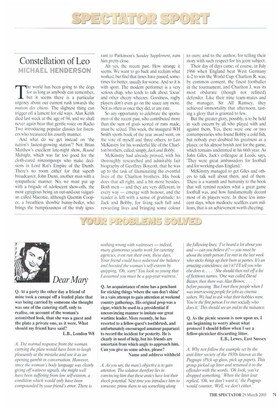Constellation of Leo
MICHAEL HENDERSON
The world has been going to the dogs for as long as anybody can remember, but it seems there is a particular urgency about our current rush towards the maison des chiens. The slightest thing can trigger off a lament for old ways. Alan Keith died last week at the age of 94, and we shall never again hear that gentle voice on Radio Two introducing popular classics for listeners who treasured his courtly manner.
And what do we get instead on the nation's fastest-growing station'? Not Brian Matthew's excellent late-night show, Round Midnight, which was far too good for the cloth-eared nincompoops who make decisions in Lord Rat's Empire of the Dumb. There's no room either for that superb broadcaster, John Dunn, another man with a sympathetic manner. No, we must put up with a brigade of adolescent show-offs, the most egregious being an out-and-out vulgarian called Maconie. although Quentin Cooper, a breathless showbiz bunny-boiler, who brings the bumptiousness of the truly igno
rant to Parkinson's Sunday Supplement, runs him pretty close.
Ah yes, the recent past. How strange it seems. We want to go back and reclaim what worked, but find that times have passed, sometimes for better, usually for worse. And so it is with sport. The modem performer is a very serious chap, who tends to talk about 'focus' and other cheery wheezes. Goodness, rugby players don't even go on the sauce any more. Not as often as once they did, at any rate.
So any opportunity to celebrate the sportsmen of the recent past, who contributed more than the sum of goals scored or runs made, must be seized. This week, the inaugural WH Smith sports book of the year award went, on the vote of myself and three others, to Leo McKinstry for his wonderful life of the Charlton brothers, called, simply, Jack and Bobby.
McKinstry had already proved, with his thoroughly researched and admirably fair biography of Geoffrey Boycott, that he was up to the task of illuminating the eventful lives of the Charlton brothers. His book does that all right, and a bit more besides. Both men — and they are very different, in every way — emerge with honour, and the reader is left with a sense of gratitude: to Jack and Bobby, for living such full and rewarding lives and bringing some colour to ours: and to the author, for telling their story with such respect for his joint subject.
Their day of days came, of course, in July 1966 when England beat West Germany 4-2 to win the World Cup. Charlton R. was, by common consent, the finest footballer in the tournament, and Charlton J, was its most obdurate (though not refined) defender. Like their nine team-mates and the manager, Sir Alf Ramsey, they achieved immortality that afternoon, tasting a glory that is granted to few.
But the greater glory, possibly, is to be held in such esteem by all who played with and against them. Yes, there were one or two contemporaries who found Bobby a cold fish, but nobody ever doubted his greatness as a player. or his almost boyish zest for the game, which remains undimmed in his 66th year. As John Giles, Jack's colleague at Leeds, says, 'They were great ambassadors for football and for working-class England.'
1VIcKinstry managed to get Giles and others to talk well about them, and of them. There is a warmth and humanity to the book that will remind readers what a great game football was, and how fundamentally decent most of its players were. In these less innocent days, when mediocre scuffiers earn millions, that is an achievement worth cheering.








































































 Previous page
Previous page